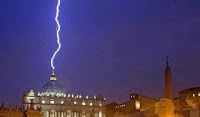Hubris meets nemesis?
 The pattern is by now familiar. Serious criticisms are leveled by serious people against the pope; the pope ignores them; and his associates and defenders disregard the substance of the criticisms while flinging ad hominem attacks at the critics. This happened during the doctrinal controversies over Amoris Laetitiaand capital punishment, and it is happening again in the wake of Archbishop Vigano’s astonishing testimony. The pope refuses to answer the charges against him. The Usual Sycophants try to smear the archbishop and his defenders as disgruntled reactionaries. Among Uncle Ted’s boys, Cardinal Cupich leapt almost immediately for the bottom of the rhetorical barrel: “Quite frankly, they also don’t like [the pope] because he’s a Latino.” This “ignore the message and pillory the messenger” strategy would be contemptible coming from a grubby ward politician. It is, needless to say, utterly unworthy of the Vicar of Christ and his cardinals. But from the point of view of cynical political calculation, it has its advantages. It has, after all, seemed to work so far.
The pattern is by now familiar. Serious criticisms are leveled by serious people against the pope; the pope ignores them; and his associates and defenders disregard the substance of the criticisms while flinging ad hominem attacks at the critics. This happened during the doctrinal controversies over Amoris Laetitiaand capital punishment, and it is happening again in the wake of Archbishop Vigano’s astonishing testimony. The pope refuses to answer the charges against him. The Usual Sycophants try to smear the archbishop and his defenders as disgruntled reactionaries. Among Uncle Ted’s boys, Cardinal Cupich leapt almost immediately for the bottom of the rhetorical barrel: “Quite frankly, they also don’t like [the pope] because he’s a Latino.” This “ignore the message and pillory the messenger” strategy would be contemptible coming from a grubby ward politician. It is, needless to say, utterly unworthy of the Vicar of Christ and his cardinals. But from the point of view of cynical political calculation, it has its advantages. It has, after all, seemed to work so far. However, I don’t think it will work this time. The conditions that facilitated it before don’t obtain in this case. Large numbers of Catholics hold heterodox views on matters of divorce and marriage and capital punishment, not to mention many other topics. They are quite happy with Amoris, the change to the catechism, and all the other doctrinally problematic statements the pope has made over the last five years. Meanwhile, many orthodox Catholics, well-meaning but naïve, have been willing to put up and shut up as long as they can cobble together some far-fetched interpretation of the problematic statements that seems to preserve continuity with past teaching. Then there are all the Catholics who aren’t even paying attention to these doctrinal controversies in the first place. Under these circumstances, writing off the critics as a minority of cranks can be effective.
The current scandal is very different. Even in the current low state of the Church and society, no one wants to defend predatory perverts and those who cover for them, much less take them on board as close advisors. Nor are there theological nuances here that might seem to provide the guilty a means of finessing the gravity of their offenses. The situation is easily understood, and, given its salaciousness, bound to draw the attention and disapproval even of people who ordinarily take no interest in Church affairs. This isn’t some abstract doctrinal controversy. It’s a question of what the pope and the cardinals closest to him knew about “Uncle Ted” and when they knew it. Under these circumstances, refusing to comment except to smear your accusers only lends plausibility to the accusations.
The pope already found out the hard way in Chile that populism does not cover a multitude of sins. It looks like the lesson may now be repeated on a much larger scale. It may be precisely the people, rather than the theologians, who prove to be the most effective critics of “the people’s pope.” However this all plays out, at this point Pope Francis’s place in history seems assured.
Related posts:
Papal fallibility
Denial flows into the Tiber
The Church permits criticism of popes under certain circumstances
Published on August 28, 2018 23:08
No comments have been added yet.
Edward Feser's Blog
- Edward Feser's profile
- 331 followers
Edward Feser isn't a Goodreads Author
(yet),
but they
do have a blog,
so here are some recent posts imported from
their feed.



